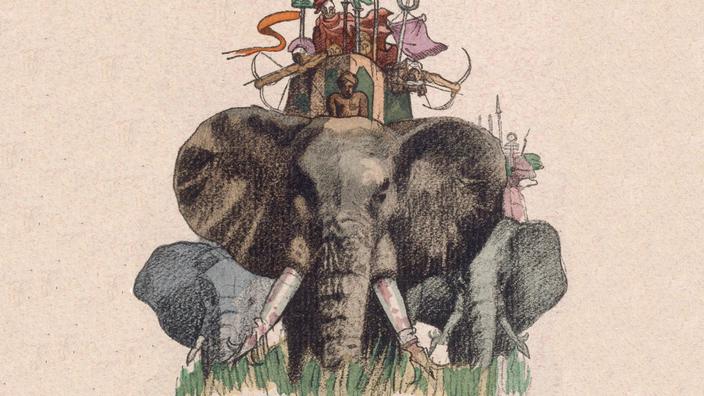Portrait of Signora Morrocchi by Antonio Puccinelli, 1859 AKG Images / De Agostini Picture Lib./G.Nimatallah
May 5, 1858. From the top of Byrsa Hill, turning his back on the Saint-Louis chapel built from 1840, Gustave contemplates the sky reflected in the sea and the mountain range.
The Cobus is brownish-purple, the Hammam-Lif looks to be bronze, red at the base, gold above, while Cape Kamart forms a sort of crescent.
Flaubert narrows his eyes as he murmurs: "
It was in Mégara, suburb of Carthage, in the gardens of Hamilcar ...
"
To read also: Michel De Jaeghere: "Madame Bovary, c'est nous"
Having left Paris on April 12, he arrived at Stora on the 18th aboard the liner Hermus to go immediately to Constantine, supposed to be the old Sicca, where the mercenaries had waited in vain for their arrears of pay.
Then he took the boat back to land in the port of La Goulette in Tunis.
Gustave found there the young Count of Saint-Foix, whom he had known in the East and who, since, has traveled with him mountains and valleys, hills and promontories.
Flaubert did not come to Tunisia to document the revolt of the soldiers against Carthage in 241 BC - he read not only Polybius but Appian, Xenophon, Plutarch and Hippocrates as well as Falbe, Dureau de La Malle and Michelet - but to soak up images and landscapes, soak up them as one gets drunk.
He seeks to discover the Punic city in a sensory way.
Everything holds him back, everything fascinates him.
The changing colors of the Mediterranean, the shape of the pebbles - some are white, others wine red -, the unusual appearance of the poplars, the strange languor of the beaches, a hill of poppies as far as the eye can see, the bluish ripples of low mountains, the curve of a bay, the texture of sand.
Read also: Gustave Flaubert, the fury to write: the muse, love and the dead
Gustave became a colourist, geographer, geologist, snake killer too.
Nothing escapes him, everything brings him back to Salammbô - it is in Tunis that he changed the name of the daughter of Hamilcar whom he had baptized in Croisset Pyrrha -, even the memories he kept of his trip in the East.
He associates them with those of whom he harvests in African soil.
Ah!
how Theophile Gautier was right to advise him to go and dream on the very ruins of Carthage!
Gustave had confided in him his desire to write an ancient epic.
To wash away the mediocrity of his century.
To find refuge in epic centuries.
His imagination was on fire.
After months of reading and research - he had mobilized all his friends - Flaubert wrote a first chapter.
But just as he was about to start the second, a doubt crept into him.
More and more corrosive.
And he decided to leave everything behind to go in search of Carthage.
He settled in a villa whose owners hold table d'hôtes.
The windows of his room overlook the ports.
On horseback, he made forays around the Punic city within a radius of twenty leagues.
On certain days, Gustave takes himself for Theseus, believing, in this maze, to discover Ariadne's thread;
others, he has the impression of looking for a chimera.
Read also: Gustave Flaubert, the fury to write: the spleen of Paris
Several expeditions are still planned.
Especially in Utique, the ancient port city founded by the Phoenicians, in Kef, in El Jem, Sousse and Sfax, if he has enough money, because escorts are expensive.
With the count of Saint-Foix they sleep in huts full of fleas, sigh with pleasure when they can take a bath, rest at the consul of Bizerte where they meet Father Jérémie, a particularly jovial former priest of Boufarik, who breeds silkworms.
Sericulture interests Gustave, but less than Carthage, and he shoots each interlocutor with questions.
“As the days go by and on the move, all the energies of nature he has captured penetrate him, fill him, and he feels ready to resuscitate the past as he returns to Tunis singing Malborough.
"
Irina de Chikoff
Throughout the days and travels, all the energies of nature he has captured penetrate him, fill him, and he feels ready to resuscitate the past as he returns to Tunis singing Malborough.
He strolls tirelessly along the streets, on the port, never forgetting to end his race with a long break on the hill of Byrsa.
To contemplate Carthage while closing your eyes.
And pray to the "
God of souls
" to give him the strength to do, "
through the Beautiful, alive and true all the same
".
At the end of May, Gustave left Tunis to go to Algeria, he crossed the colony from east to west, then joined Philippeville and embarked for France.
On June 9, Gustave is in Croisset.
He slept there for forty-eight hours before resuming his notes to which he added a prayer: “
Resurrection of the past, to me!
To me !
"
This article is from the
Figaro Hors-Série:
Flaubert, la fureur d'être
.
Discover Flaubert's eventful life, his friendships, his work, his characters, his quest for the perfect style on
Figaro Store
.
Portrait of Signora Morrocchi by Antonio Puccinelli, 1859 AKG Images / De Agostini Picture Lib./G.Nimatallah









